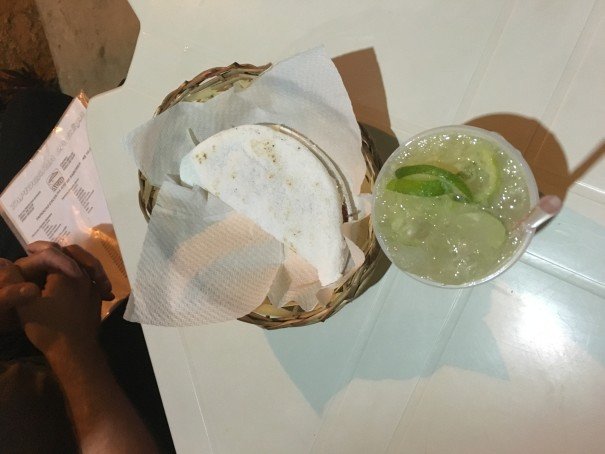
The Light and Dark of an Overpriced Paradise

The Light and Dark of an Overpriced Paradise
Caipirinhas in Vila dos Remedios
We were halfway through our drinks when the proprietor came to take our food order. He pointed at the plastic cup in my hand, dripping with dew in the heated night.
“Not too strong? More lime?” he asked.
I shook my head and covered the cup with my hand. The caipirinha was strong, but the melting ice was watering down the cachaça and the alcohol was welcome after a long day on a dive boat. The proprietor laughed.
“My wife makes them very strong. Too strong for me,” he said, before taking our orders and disappearing into the living room that doubled as kitchen.
We were spending a week in the tiny town of Vila dos Remedios on the small island Fernando de Noronha, located several hundred miles from its motherland Brazil in the vast South Atlantic. The tapioceria had quickly become our regular dinner spot. With its cheap, tasty tapiocas—Brazilian crepes made out of snow-white manioc flour—strong caipirinhas, and wobbly plastic chairs, the family-run restaurant offered a welcome respite from the generic, glitzy restaurants that made up the rest of the island’s dining options.
The tapioceria consisted of four tables on a tiny, weathered concrete patio opposite a crumbling church. When my boyfriend walked inside the restaurant to look for the restroom, the proprietor’s family looked at him in bewilderment; he had accidentally walked into their living room.
The only other patrons were a group of diving instructors from the neighboring dive shop. Like us, they came here every night for the crusty crepes filled with shrimp, cheese, and vegetables, accompanied by caipirinhas mostly consisting of pungent sugarcane liquor. Most other people at the island seemed to opt for the more upscale restaurants; they’d pass by the tapioceria, located at the bottom of the hill that makes up the town, in brightly colored dune buggies.
We recognized most of the tourists passing by, partly because we all seemed to use the same dive shop and partly because local rules allows a maximum of 200 daily visitors on the island. In 1998, the archipelago of 21 islands was declared a national marine park, which covers 70 percent of the biggest and only inhabited island. The consequences, good and bad, were profound.
The islands became more known to the world but less accessible to many Brazilians. The marine life benefited from the regulations protecting the marine park, and the wide and sandy undeveloped beaches and world-class diving began attracting more and more wealthy visitors. The result was a tourism industry focusing almost exclusively on the upscale market. Hefty daily marine park entry fees, a lack of budget accommodation options and the fact that the islands are only accessible by pricey flights further alienated many local visitors. Whenever my boyfriend and I had told Brazilians from the mainland about our trip to the archipelago, they’d look at us with big, dreamy eyes and tell us they’d always wanted to go but couldn’t afford it. We’d look at each other, slightly worried about what we’d gotten ourselves and our limited travel budget into.
When we arrived at Fernando, we found that we benefited from the restricted amount of visitors during the days, which we spent diving the arches, canyons, and grottos teeming with marine life or walking the deserted beaches that topped most lists of the best beaches in Brazil. At night, however, we’d have difficulty staying in love with the island. We’d discuss at which upscale restaurant we should bust our budget while walking down from our overpriced pousada, yet always reverted to that same tapioceria at the bottom of the hill.
The diving instructors’ gossiping and laughter was quelled by the music flowing from the church. We could smell the grilled cheese from the open window in which the proprietor’s wife was frying food and mixing drinks. The proprietor came over with the tapiocas, served in red plastic baskets and a napkin as white as the crepes. We thanked him and ordered one more round of caipirinhas.